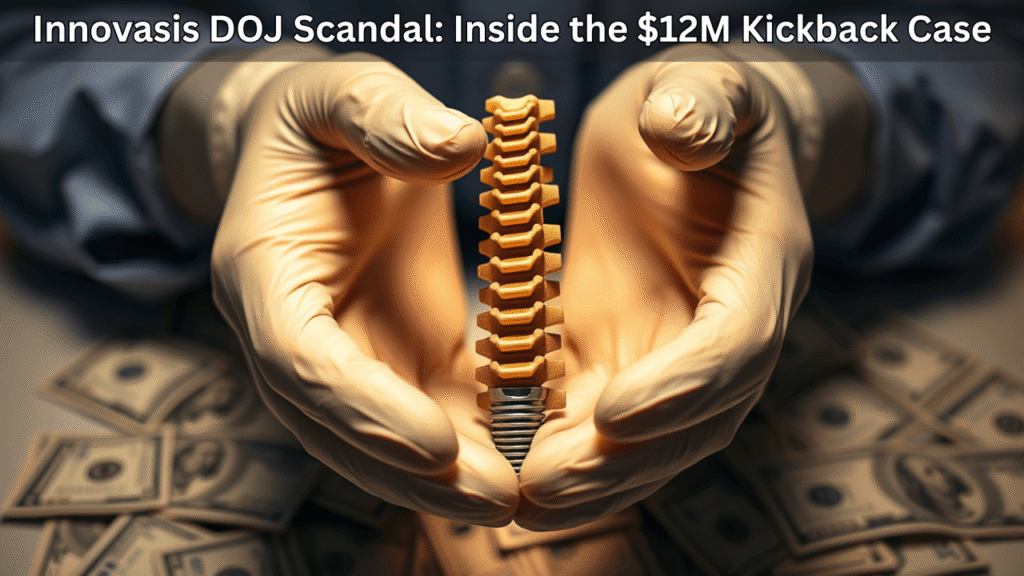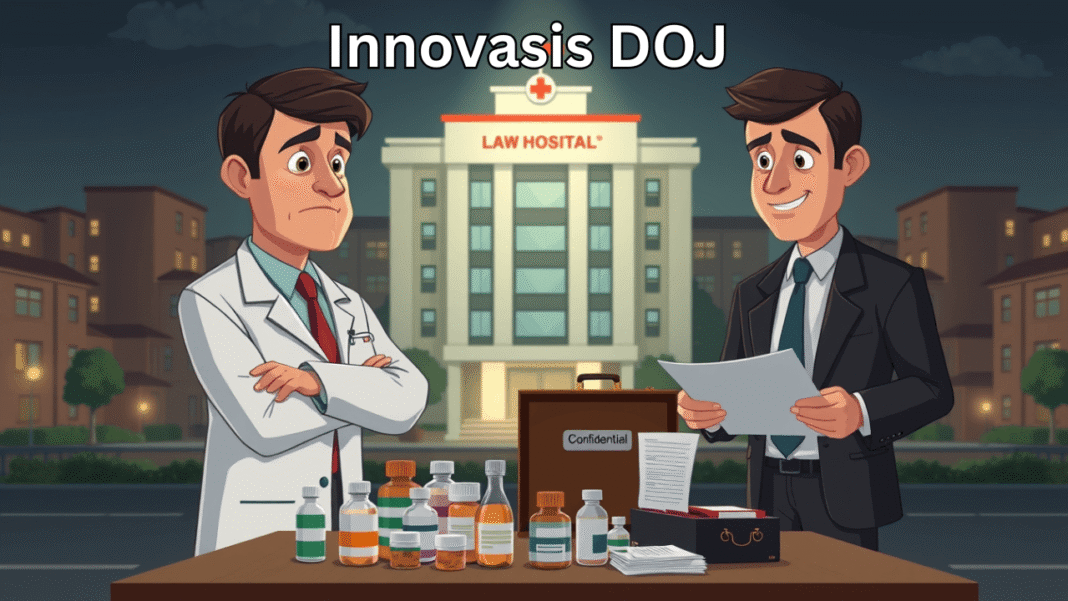Let’s be real for a second. When we walk into a hospital, sit down with a surgeon, or agree to a procedure, we trust that it’s for our own good. But what happens when that trust is broken—not by malpractice, but by shady backroom deals? Enter the Innovasis DOJ case, a real-life drama that’s got it all: corruption, courage, and a $12 million settlement.
This isn’t just another corporate slap on the wrist. This is about a company playing dirty with our health system, and one brave man who called it out.
Rover Richardson and the Innovasis DOJ Whistleblower Case
Let’s start with the whistleblower—Rover Richardson. Now, this guy wasn’t just sitting in a cubicle filing reports. He was a regional sales director at Innovasis, Inc., a spine implant company based in Utah. That gave him a front-row seat to what was happening behind the curtain.
And what did he see? Let’s just say it wasn’t pretty.
Richardson watched as Innovasis DOJ dealings started crossing into dangerous territory. Surgeons were being handed fat “consulting fees,” so-called “research grants,” and “royalties” for choosing Innovasis’s spinal devices. But these payments weren’t for groundbreaking science or innovation—they were incentives to use Innovasis products, whether or not they were best for the patient.
If that sounds like a classic medical kickback, that’s because it is.
How Innovasis DOJ Kickbacks Put Patients at Risk
In plain English, a medical kickback is when someone in healthcare secretly gets paid to steer business to a company. That’s illegal, unethical, and dangerous.
Think about it: Would you want your surgeon choosing a device because of a bonus rather than what’s medically best?
The Innovasis DOJ case uncovered exactly that. Surgeons receiving payments were far more likely to use Innovasis products, raising massive red flags with federal investigators.
The DOJ Steps In: A Case That Couldn’t Be Ignored
When Richardson filed his lawsuit under the False Claims Act—specifically, the qui tam provision—it sent shockwaves through the industry. This law allows private citizens to sue on behalf of the government when they believe federal funds are being misused.
In this case, the allegation was clear: Innovasis was gaming the system, getting doctors to choose their products for kickbacks, and charging it all to federal healthcare programs like Medicare.
The Department of Justice didn’t sit back. The Innovasis DOJ investigation went full throttle, and what they found was damning.
A $12 Million Wake-Up Call: Innovasis Pays Up

Let’s talk numbers. After the dust settled and the DOJ stacked up its evidence, Innovasis agreed to pay a massive $12 million in a civil settlement. But it wasn’t just about the money.
As part of the Innovasis DOJ settlement, the company had to implement a major internal overhaul:
- Mandatory employee compliance training
- Strict oversight on financial dealings
- Routine audits to keep everything clean
This wasn’t just window dressing—it was an attempt to rebuild a reputation that had taken a serious hit.
Rover Richardson’s Reward: Justice and $2.2 Million
So what happened to the man who blew the whistle?
Richardson was awarded $2.2 million for his role in the case. And let’s be honest—that’s well-earned. Whistleblowing is no small feat. It comes with personal, professional, and even legal risks. But because of his courage, the Innovasis DOJ scandal didn’t stay hidden.
He became a symbol of integrity in a system that can all too easily lose its moral compass.
Why the Innovasis DOJ Case Matters to You
Sure, the Innovasis DOJ story sounds like corporate drama, but the implications are very real. This case sends a message:
- To doctors: Your decisions should serve the patient, not your bank account.
- To medical companies: Backdoor deals come with a price.
- To the public: You have the right to demand transparency in healthcare.
Without whistleblowers like Richardson, stories like this would stay buried. The Innovasis DOJ case reminds us that ethical healthcare isn’t just an ideal—it’s a necessity.
Understanding the Law: Stark vs. Anti-Kickback
This scandal also shines a light on two critical laws in healthcare compliance:
- The Anti-Kickback Statute: This makes it a crime to offer or receive anything of value for patient referrals covered by federal programs.
- Stark Law: This prohibits physicians from referring patients to entities with which they have a financial relationship.
The Innovasis DOJ fallout showed clear violations—surgeons taking money and referring patients, while taxpayers footed the bill.
What Happens Now? The Road Ahead for Innovasis
With the $12 million settlement and a new compliance program in place, Innovasis is trying to move forward. But make no mistake—their name will be tied to this scandal for years to come.
The Innovasis DOJ case is now part of a growing list of corporate frauds in the healthcare world. It’s a lesson in accountability and a reminder that justice does catch up—eventually.
Thinking You’ve Seen Something Similar? Speak Up.
Healthcare fraud hurts everyone. It wastes taxpayer dollars, undermines trust, and puts lives at risk. If you’ve seen or suspect illegal activity like this, know that resources are available to help you report it—confidentially and safely.
The Innovasis DOJ case didn’t just happen because one person noticed something wrong. It happened because he did something about it.
FAQs on the Innovasis DOJ Kickback Case
Q: What was the Innovasis DOJ case about?
A: It involved a whistleblower exposing how Innovasis paid doctors kickbacks to use their spinal implants, leading to a $12M DOJ settlement.
Q: Who exposed Innovasis?
A: Rover Richardson, a former sales director, filed a lawsuit under the False Claims Act, revealing unethical practices.
Q: Why are kickbacks illegal in healthcare?
A: They compromise patient care by encouraging decisions based on money—not what’s medically best. That’s why laws like the Anti-Kickback Statute exist.
Q: How much did the whistleblower receive?
A: Richardson earned a $2.2 million share from the settlement for his crucial role in bringing the truth to light.
Q: What laws were potentially violated in the Innovasis DOJ case?
A: Mainly the Anti-Kickback Statute and the False Claims Act, both of which prohibit financial influence on federally funded healthcare decisions.
The Final Word
The Innovasis DOJ scandal is more than just a headline—it’s a wake-up call. It proves that even in high-stakes industries like healthcare, wrongdoing doesn’t go unnoticed forever.
Legal controversies continue to rock the financial and healthcare sectors alike. If you’re following the Innovasis DOJ scandal, you’ll also want to read our investigation into the Augusta Precious Metals Lawsuit, where we uncover the truth behind the claims and courtroom developments affecting investors nationwide.
And for the rest of us? It’s a reminder to stay informed, ask questions, and never underestimate the power of one voice speaking out.



